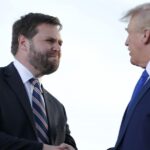WASHINGTON (AP) — Donald Trump is heading into the Republican National Convention with ambitious promises regarding the U.S. economy, but he has provided few specifics on how his plans would be implemented.
Despite Saturday’s shooting at a Trump rally in Pennsylvania where the former president was injured, the convention’s first day is still expected to focus on the economy.
If the program proceeds as scheduled, speakers are likely to discuss how Trump’s proposed agenda of tariffs and tax cuts would stimulate the economy.
Trump has expressed interest in imposing tariffs on trade partners, eliminating tips taxes, and reducing the corporate tax rate slightly. The Republican platform also includes plans to combat inflation, lower prices, increase oil and gas production, and implement a significant deportation program for illegal immigrants. Furthermore, Trump aims to reverse President Joe Biden’s policies on electric vehicles and renewable energy.
Opponents, including Democrats and several economists, argue that Trump’s proposals would lead to inflation, harm the middle class, and increase the national debt by extending tax cuts he previously implemented.
Trump has not provided detailed numbers or policy language, relying instead on his campaign’s emphasis on attitude over specifics.
While Biden has outlined a comprehensive 188-page budget proposal, questions remain about his viability as a candidate after a rocky debate and concerns about his age.
Experts warn that Trump’s proposed deportation program could shrink the U.S. economy and trigger a recession. Some, like economist Stephen Moore, believe Trump’s previous term in office provides insight into his potential second-term agenda.
Debates over Trump’s possible second term have focused on concerns about his extreme policies, including claims that he would exert unprecedented control over federal agencies and settle personal scores using government resources.
Despite bipartisan support for some of his economic ideas, such as cutting regulations and corporate tax rates, Trump’s proposed tariffs have raised concerns about inflation and consumer costs.
Analysis suggests that Trump’s tariff policies could have significant economic repercussions, potentially making imports more expensive and exacerbating current inflation rates.
While tariffs may have political benefits, their economic impacts could be severe, potentially leading to higher costs for raw materials and consumer goods.
Experts caution that understanding the risks of Trump’s economic policies is crucial to prevent a potential economic disaster.
Copyright 2024 The Associated Press. All rights reserved. This material may not be published, broadcast, rewritten, or redistributed without permission.





